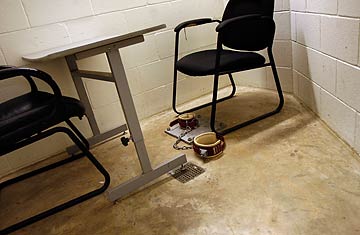
Ankle cuffs are used to restrain prisoners at the detention facility at the U.S. Naval Station in Guantanamo Bay, Cuba.
The Right screams that it's a witch-hunt, the Left complains it's a cop-out, and President Obama wishes it would just go away. But Senator Patrick Leahy isn't about to drop his proposal for a Truth Commission to investigate wrongdoing in the Bush Administration. "We would be making bad mistake, for history's purpose, if we walk away from this," the Vermont Democrat told TIME.
The President has said he would look at Leahy's proposal, but that he was "more interested in looking forward than in looking back," as he put it at last week's prime-time news conference (though he added that any crime should be prosecuted). Leahy, chairman of the Senate Judiciary Committee, is not in any mood to let bygones be bygones, and he reportedly discussed his idea of the commission with White House chief counsel Gregg Craig last week. "It's a lot easier to look forward if you know what happened in the past," he told TIME. (See pictures of life inside Guantanamo.)
As Leahy envisions it, the Truth Commission's priorities would be to investigate the politicization of prosecution in the Justice Department under former Attorney General Alberto Gonzales; the wiretapping of U.S. Citizens; the flawed intelligence used to justify the invasion of Iraq; and the use of torture at Guantanamo and so-called black sites abroad. Leahy's commission is to be modeled after one that investigated the apartheid regime in South Africa. The panel would have subpoena power but would not bring criminal charges. The South African commission also allowed those testifying to seek immunity from prosecution.
Bush's harshest critics think Leahy's controversial plan doesn't even go far enough. They argue that a Truth Commission would amount to a get-out-of-jail pass for officials who they believe broke the law; they would prefer to see more muscular criminal investigations and prosecution of top officials, possibly Bush himself. Leahy, a 34-year Senate veteran, says he understands the sentiment. "Instinctively, I'd prefer prosecutions too, but in my experience you usually end up getting only the small guys while the top people get away," Leahy told TIME, citing as an example the investigation into the Abu Ghraib scandal. (See pictures of the abuse revelations at Abu Ghraib.)
Besides, he added, "a thorough prosecution could take 12-15 years, and I would like to get some answers quickly." Long, drawn-out processes like the one that led to the indictment of President Bill Clinton "usually don't get to the bottom of things and don't benefit the country," he said.
Perhaps surprisingly, a majority of Americans polled recently by Gallup expressed their support for some kind of investigation into Bush-era wrongdoing such as the politicization of the Justice Department or torture, though much of the backing was for an independent panel, not a criminal probe. But a sampling of constitutional and legal experts polled by TIME was split on whether a Truth Commission would be the right way to investigate allegations against Bush officials.
"Truth Commissions don't fit particularly well with our system," says John Q. Barrett, who helped investigate the Iran-Contra scandal in the 1980s and in the prosecution of several Reagan Administration officials. Now a law professor at New York's St. John's University, Barrett argues that the Congress already has all the powers "to compel testimony and grant immunity" that Leahy wants for his Truth Commission. "Creating a whole new entity would be a huge bureaucratic exercise," he says. It would be an "effort to shunt off something that can be done by Congress." And indeed, Leahy told the Huffington Post that if the President doesn't sign on to his idea, he fully expects Congress to launch its own investigation of Bush administration wrongdoing — though he acknowledged it would be much easier with Obamas' cooperation.
Sharper criticism for Leahy's proposal comes from political philosopher Jean Bethke Elshtain, who dismisses it as "preposterous." She accuses the Senator of trying to damn the Bush Administration by association. Since the concept of a Truth Commission is associated with South Africa and Latin American countries, Leahy is "analogizing the Bush Administration to the Apartheid regime and to Argentinian juntas."
"Truth Commissions are for societies that have gone through tremendous upheaval, and need a way to heal wounds," says Elshtain, who teaches social and political ethics at the University of Chicago Divinity School. "That has nothing to do with the situation in the U.S."
But Columbia University Law School's Sarah Cleveland cautions against reading too much into the South African association. The process Leahy is proposing, she says, is closer to the 9/11 Commission. "It is a very important first step in helping the country to understand what happened, and making sure we don't go down that way again," she says.
Cleveland says it's a good idea to separate the commission from the Hill, "to make it genuinely bipartisan, and to avoid grandstanding by Congressmen."
But she cautions against offering immunity up-front to those testifying, pointing out that this had not worked well in the Iran-Contra investigations. Leahy's Truth Commission, she says, "can only be an intermediate step — eventually, you'll need to prosecute."
